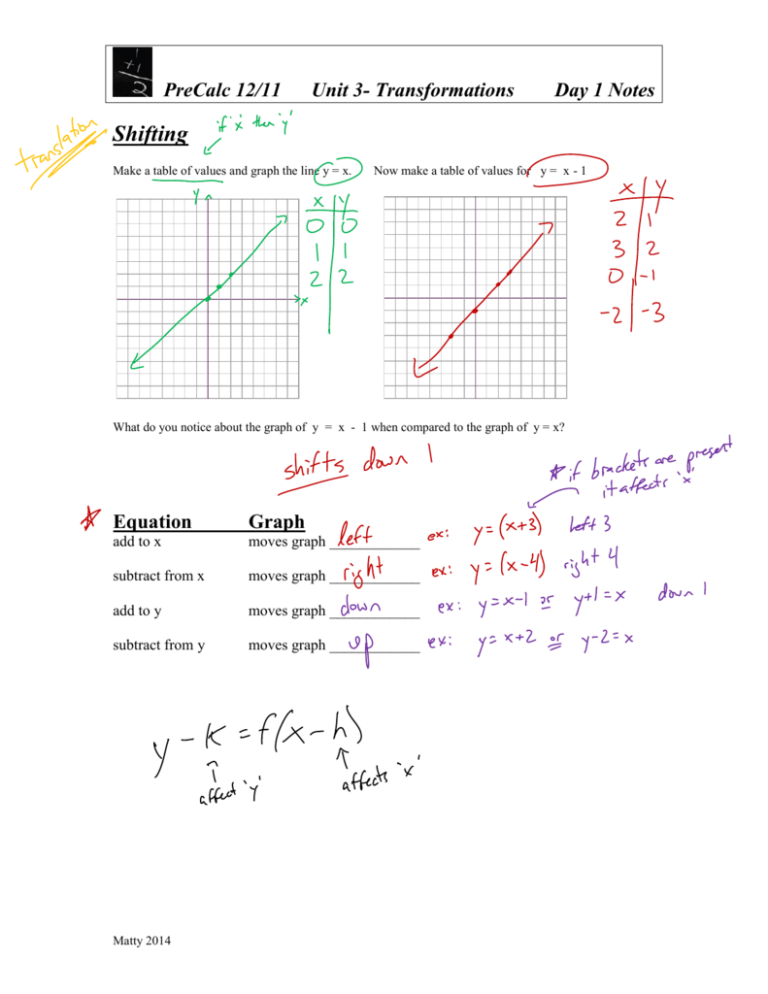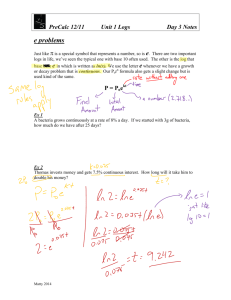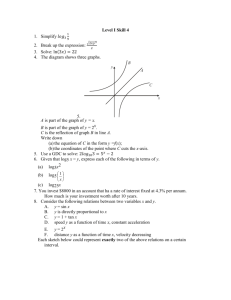Old Transformations Day 1
advertisement

PreCalc 12/11 Unit 3- Transformations Day 1 Notes Shifting Make a table of values and graph the line y = x. Now make a table of values for y = x - 1 What do you notice about the graph of y = x - 1 when compared to the graph of y = x? Equation Graph add to x moves graph ____________ subtract from x moves graph ____________ add to y moves graph ____________ subtract from y moves graph ____________ Matty 2014 PreCalc 12/11 Ex 1 Unit 3 Transformations Day 1 Notes Page 2 Graph the following three functions on the same graph. y x y x 3 y x 3 Note: The notation y k f (x) is often used instead of y f (x) k to emphasize that the parameter k involves a translation in the y-direction only. For example, instead of y x 3 , we could write y 3 x . Ex 2 Graph the following three functions on the same graph. y x Matty 2014 y x3 y x3 PreCalc 12/11 Unit 3 Transformations Day 1 Notes Page 3 Changing Equations Sometimes instead of changing the graph we can just change the equation. Ex 1 Given the function y f (x) , write the equation of the transformed function after each of the following translations. a) a vertical translation 4 units down. b) a horizontal translation 5 units to the right. c) a horizontal translation 3 units to the left and a vertical translation 6 units up. Ex 2 In each case below, the given point is transformed into a second point by a certain translation. Find the coordinates of the second point. a) a horizontal translation 3 units to the left (4 , –6) ( , ) b) a vertical translation 5 units down (–3 , –5) ( , ) c) a horizontal translation 4 units to the right and a vertical translation 6 units up (–7 , 2) ( , ) Ex 3 In each case below, a graph of y f (x) is shown. Sketch the graph of the translated function whose equation is given. a) y f (x) 2 Matty 2014 b) y f (x 3) PreCalc 12/11 Unit 3 Transformations Day 1 Notes Page 4 Reflections The graph of y f (x) is a reflection of the graph of y f (x) in the_______________ . The graph of y f (x) is a reflection of the graph of y f (x) in the_______________ . Ex 1 Graph the indicated functions from the original y = f(x) a) y f (x) Matty 2014 b) y f (x) PreCalc 12/11 Unit 3 Transformations Day 1 Notes Page 5 Stretching / Compressing Just like our translations were all backwards as far as what we expected, the expanding of a graph is the same. Making an equation bigger has the opposite effect on the graph and makes the graph smaller . Ex 1 Sketch the graph of y 3 x . We can obtain the graph of y 3 x from the graph of y x through two transformations: a) _____________________________________________________ b) ______________________________________________________ Ex 2 The grid below contains the graph of a function y f (x) . Sketch the graph of y f ( 13 x) . Matty 2014 PreCalc 12/11 Unit 3 Transformations Day 1 Notes Page 6 Ex 3 The graph of a function y f (x) is expanded vertically by a factor of 3, compressed 1 horizontally by a factor of 4 , and then reflected in the y–axis. If the equation of its image is y af (bx) , determine the values of a and b for the transformation. To be consistent with the general transformation function y af (b(x p)) q , use the following order when applying combinations of two or more transformations: 1) _________________________________________________________________ 2) _________________________________________________________________ 3) __________________________________________________________________ Ex 4 The point (5, –2) is on the graph of the function y f (x) . Track (5, –2) through each of the following five transformations to its final image. Transformation Original point of y f (x) Image of (5, –2) (5 , –2) reflected in the x-axis ( , ) compressed vertically by a factor of 1/2 ( , ) expanded horizontally by a factor of 5 ( , ) translated horizontally 4 units to the right ( , ) translated vertically 5 units down ( , ) Matty 2014 PreCalc 12/11 Unit 3 Transformations Day 1 Notes Page 7 In summary, we can adjust all our graphs and all our equations in one of two ways: a( y d ) fb( x c) y afb( x c) d Matty 2014



